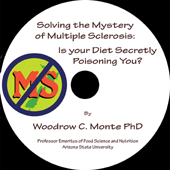Aspartame victim “repoisoned”
Components of the artificial sweetener aspartame re-poisoned chewing gum victim Abby Cormack, the 25 year old chewing gum victim who was poisoned with aspartame, has discovered she has been repoisoned. She will present her story at the Wellington School of Medicine today (25th July) at 12.30pm. International expert on aspartame, Betty Martini, currently visiting New Zealand, will examine some research about this controversial additive and will describe its chequered history.
The additive artificial sweetener aspartame (951/Equal/NutraSweet ) is used in many different types of processed food, especially sugar free and diet products, and also sports drinks and medicines.
Betty Martini argues aspartame disease is an ignored epidemic rivalling tobacco in its public health effects. Ms Martini believes, “because doctors are being denied the real truth about aspartame, this ties their hands to diagnose and treat patients. Doctors have no idea aspartame interacts with all drugs, something that is vital for the medical profession to know.”
Betty brings with her the documents from the US government the medical profession and consumers have been denied. Asked why aspartame remains on the market she says, “For the same reason as tobacco, addiction, profit and greed.”
Ralph Walton, MD, Professor of Clinical Psychiatry at Ohio USA, commenting on Abby Cormack’s case, has stated “Tragically, Abby’s experience with aspartame is far from unique. In 1985 I first encountered a clinical situation in which aspartame clearly triggered a manic episode in one of my patients. I initially made an incorrect diagnosis of bipolar disorder. [However] the total elimination of all aspartame resulted in fairly rapid resolution of her symptoms. I believe it is essential for all physicians to include a dietary history when assessing patients. Whenever aspartame is found to be included in the diet, I would encourage all health care professionals to educate their patients about the hazards and encourage complete abstinence from this artificial sweetener. In my own practice, I have found that many patients improve substantially with just this simple change.”
“The public and the medical profession need to be made aware of the effects of this dangerous additive, especially since exposure is so common among our population,” said Alison White, Co-convenor of the Safe Food Campaign.
Steffan Browning of the Soil & Health Association commented, “Research has proved aspartame to be an addictive neurotoxin and carcinogen. If aspartame cannot be immediately removed from the market, then at least there should be a warning it can cause foetal brain damage, behavioural problems in children and cancer.”
http://www.scoop.co.nz/stories/print.html?path=PO0707/S00298.htm
Wednesday, 25 July 2007, 10:06 am
Press Release: Soil and Health Association
Media release 25 July 07
Safe Food Campaign and Soil & Health Association


